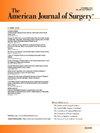少即是多:在修改后的脑损伤指南中简化对孤立性创伤性蛛网膜下腔出血的管理
IF 2.7
3区 医学
Q1 SURGERY
引用次数: 0
摘要
背景孤立性外伤性蛛网膜下腔出血(iTSAH)患者按照改良脑损伤指南(mBIG)分级管理。本研究旨在描述 iTSAH 患者的情况并分析其临床结果。排除标准为格拉斯哥昏迷量表(GCS)< 13和受伤前使用抗血小板/抗凝剂。80.4%的患者接受了神经外科会诊。共有 19 例(8.6%)患者出现放射学进展。6名患者(2.2%)出现神经功能恶化。没有患者需要手术治疗或再次入院。结论尽管部分 iTSAH 患者的影像学或神经系统病情有所进展,但没有患者需要神经外科会诊。这些患者可能不需要重复头部 CT 扫描或神经外科会诊,因此有必要改变 mBIG 中的 SAH 定义。本文章由计算机程序翻译,如有差异,请以英文原文为准。
Less is more: Streamlining management of isolated traumatic subarachnoid hemorrhage in the modified brain injury guidelines
Background
Patients with isolated traumatic subarachnoid hemorrhage (iTSAH) are managed according to the modified Brain Injury Guidelines (mBIG) class. The current study aimed to describe patients with iTSAH and analyze their clinical outcomes.
Methods
A retrospective analysis was performed on trauma patients with iTSAH. Exclusion criteria were Glasgow Coma Scale (GCS) < 13 and pre-injury antiplatelet/anticoagulant use.
Results
276 patients were identified over the 8-year study period. The median number of head CT scans was 2. Neurosurgery consultation was obtained in 80.4 % of patients. A total of 19 (8.6 %) patients had radiographic progression. Six (2.2 %) patients had neurologic deterioration. No patients required operative intervention or readmission. No deaths were related to iTSAH.
Conclusions
There were no patients with iTSAH that required neurosurgical consultation despite a subset of patients having radiographic or neurologic progression. These patients may not require repeat head CT scan or neurosurgical consult, necessitating a change of SAH definitions in the mBIG.
求助全文
通过发布文献求助,成功后即可免费获取论文全文。
去求助
来源期刊
CiteScore
5.00
自引率
6.70%
发文量
570
审稿时长
56 days
期刊介绍:
The American Journal of Surgery® is a peer-reviewed journal designed for the general surgeon who performs abdominal, cancer, vascular, head and neck, breast, colorectal, and other forms of surgery. AJS is the official journal of 7 major surgical societies* and publishes their official papers as well as independently submitted clinical studies, editorials, reviews, brief reports, correspondence and book reviews.

 求助内容:
求助内容: 应助结果提醒方式:
应助结果提醒方式:


